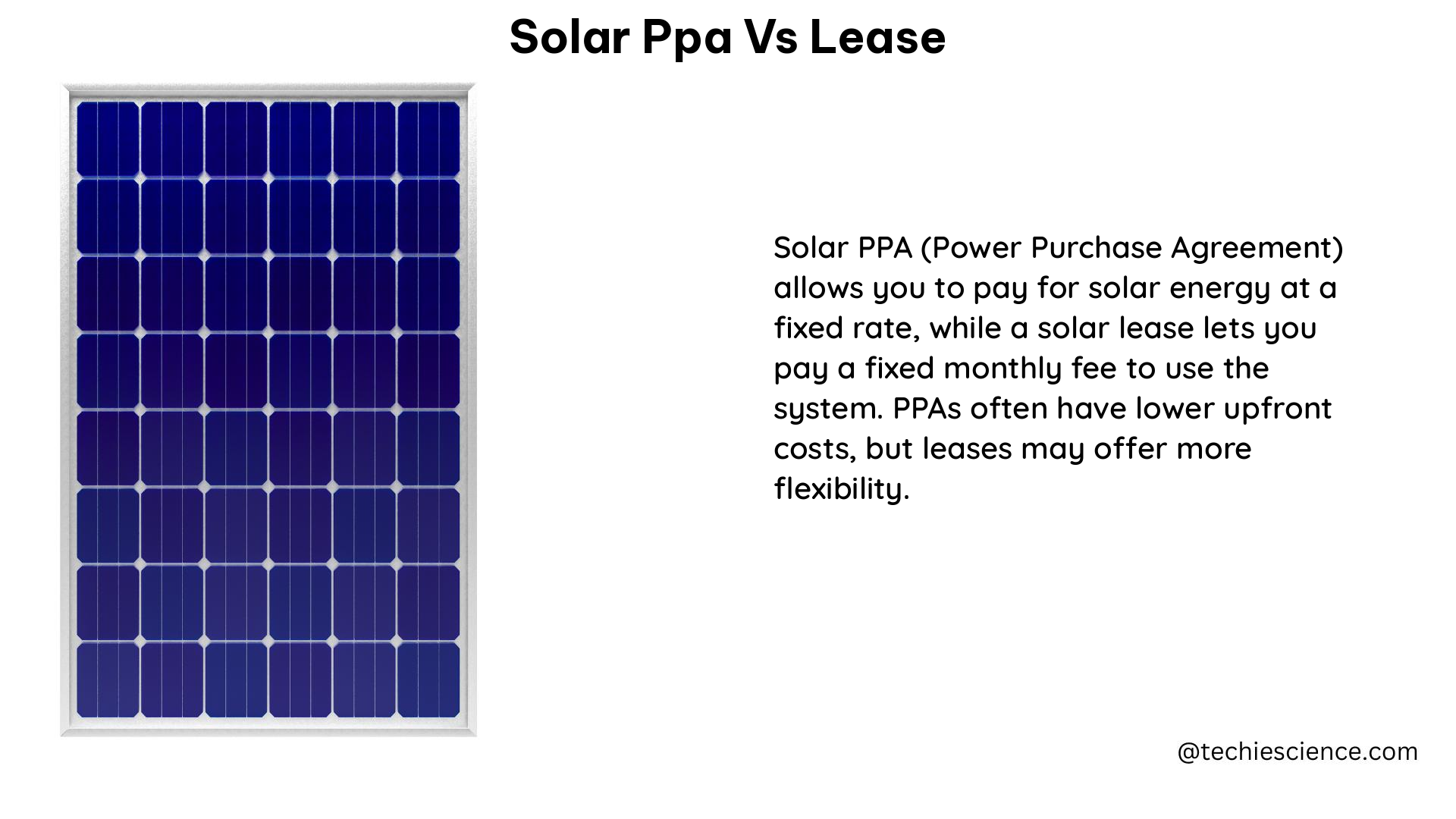Solar Power Purchase Agreement (PPA) and Solar Lease are two popular financing options for homeowners who want to install solar panels without making a significant upfront investment. Both options have their advantages and disadvantages, and the choice between the two often depends on the homeowner’s specific needs and circumstances.
Cost Structure
Solar PPA:
– The homeowner agrees to purchase the electricity generated by the solar system at a fixed rate per kilowatt-hour (kWh) for a set period, usually 20-25 years.
– The fixed rate is typically lower than the local utility’s electricity rate, allowing the homeowner to save on their electricity bills.
– The solar company is responsible for the system’s installation, maintenance, and repairs, which are included in the fixed rate.
Solar Lease:
– The homeowner agrees to rent the solar system for a fixed monthly payment over the same period, usually 20-25 years.
– The monthly payment is typically lower than the homeowner’s current electricity bill, resulting in immediate savings.
– The solar company is responsible for the system’s installation, but the homeowner is responsible for its maintenance and repairs.
Ownership

Solar PPA:
– The solar company owns and maintains the system.
– The homeowner simply purchases the electricity generated by the system.
Solar Lease:
– The homeowner does not own the system, but they are responsible for its maintenance and repairs.
– The solar company retains ownership of the system and is responsible for its performance and upkeep.
Savings
Both Solar PPA and Solar Lease options offer the potential for significant savings on electricity costs over the life of the agreement. However, the amount of savings can vary depending on several factors:
- System Size: The larger the solar system, the more electricity it can generate, and the greater the potential savings for the homeowner.
- Electricity Usage: Homeowners with higher electricity usage will typically see more significant savings with either a Solar PPA or Solar Lease.
- Local Electricity Rates: The higher the local utility’s electricity rates, the more the homeowner can save with a Solar PPA or Solar Lease.
On average, homeowners can expect to save 10-30% on their electricity costs with either a Solar PPA or Solar Lease.
Upfront Costs
Solar PPA:
– Typically requires little or no upfront costs for the homeowner.
– The solar company covers the initial installation and equipment costs.
Solar Lease:
– Typically requires little or no upfront costs for the homeowner.
– However, some Solar Lease agreements may require a down payment or upfront fees.
Early Termination
Both Solar PPA and Solar Lease options have early termination fees, which can be significant. Homeowners should carefully review the terms of the agreement before signing up for either option.
Environmental Impact
Both Solar PPA and Solar Lease options can help homeowners reduce their carbon footprint and support the transition to renewable energy. However, the environmental impact of each option may vary depending on the specific details of the agreement, such as the source of the electricity being purchased or the efficiency of the solar system.
Technical Specifications
Solar PPA:
– The solar company owns and maintains the system.
– Homeowner purchases electricity at a fixed rate per kWh.
– Typically requires little or no upfront costs.
– Savings can vary depending on the size of the system, electricity usage, and local rates.
– Early termination fees may apply.
– Can help reduce carbon footprint and support renewable energy.
Solar Lease:
– Homeowner rents the solar system for a fixed monthly payment.
– Homeowner is responsible for maintenance and repairs.
– Typically requires little or no upfront costs.
– Savings can vary depending on the size of the system, electricity usage, and local rates.
– Early termination fees may apply.
– Can help reduce carbon footprint and support renewable energy.
In conclusion, both Solar PPA and Solar Lease options offer homeowners the opportunity to install solar panels without making a significant upfront investment. The choice between the two ultimately depends on the homeowner’s specific needs and circumstances, such as their financial situation, electricity usage, and long-term goals. It is essential to carefully review the terms of the agreement and consider factors such as cost structure, ownership, savings, upfront costs, early termination fees, and environmental impact before making a decision.
References:
– Glyde Solar – Solar Lease vs PPA: Differences Explained
– CNET – Solar Lease vs. Power Purchase Agreement: Which Is a Better Deal?
– EnergySage – Solar Leases vs. PPAs: Which is Better?

The lambdageeks.com Core SME Team is a group of experienced subject matter experts from diverse scientific and technical fields including Physics, Chemistry, Technology,Electronics & Electrical Engineering, Automotive, Mechanical Engineering. Our team collaborates to create high-quality, well-researched articles on a wide range of science and technology topics for the lambdageeks.com website.
All Our Senior SME are having more than 7 Years of experience in the respective fields . They are either Working Industry Professionals or assocaited With different Universities. Refer Our Authors Page to get to know About our Core SMEs.